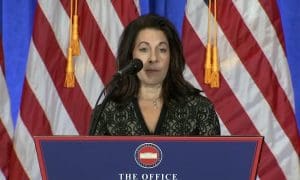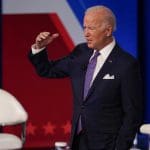Trump's lawyer makes devastating case against Trump's conflicts of interest
A significant portion of the press conference that President-elect Donald Trump finally held (after a 6-month drought) was eaten up by Trump attorney Sheri Dillon’s explanation of Trump’s plan to address conflicts of interest arising from his business holdings. And since that press conference, ethics experts on all sides have denounced the plan as essentially […]

A significant portion of the press conference that President-elect Donald Trump finally held (after a 6-month drought) was eaten up by Trump attorney Sheri Dillon’s explanation of Trump’s plan to address conflicts of interest arising from his business holdings.
And since that press conference, ethics experts on all sides have denounced the plan as essentially meaningless. Former Obama administration ethics czar Norm Eisen said in a statement that the plan “falls short in every respect,” and added, “Mr. Trump’s ill-advised course will precipitate scandal and corruption. I and many others will respond strongly in defense of ethics and our constitution.”
Former chief ethics lawyer for the George W. Bush administration, Richard Painter, who has been making the rounds of cable news with Eisen in order to express his complete dissatisfaction with the plan, painted a vivid picture of a President-elect Trump whose judgment is still compromised:
“He has all of the conflicts of interest that he had before,” said Richard Painter, who served as chief ethics lawyer in the George W. Bush administration. “We don’t know who his business partners are, we don’t know who he owes.”
“I hope we don’t have a terrorist attack on some building with his name on it,” Painter added. “I hope we don’t have an international crisis in a country where he has a lot of money invested. If Turkey and Russia get in a fight or something, it’s not a question about, well, what about my hotel?”
Leading constitutional law professor Lawrence Tribe called the plan “fraudulent,” among other things:
1/As I listened, my jaw dropped. Trump's workaround is a totally fraudulent runaround. A Potemkin Village of a trust at best.
— Laurence Tribe (@tribelaw) January 11, 2017
3/Trump's lawyer would flunk constitutional law at any halfway decent law school. At least if the lawyer wasn't just joking.
— Laurence Tribe (@tribelaw) January 11, 2017
In a statement, Rep. John Sarbanes (D-MD) put the president-elect’s complaints about a blind trust in perspective:
“The complexity of unwinding the President-elect’s business interests pales in comparison to the unprecedented conflicts of interest and ethical lapses that he will bring into the Oval Office if he does nothing. By retaining his business assets, the President-elect will keep raising an important question in the minds of most Americans: is he really working for us or is he only working to line his own pocketbook?
“The plan announced yesterday is wholly insufficient. Divestiture or entering into a legitimate blind trust are the only real solutions for the President-elect to avoid conflicts of interest. And to be clear, divestiture does not need to be immediate or reckless. The President-elect can and should receive fair compensation for his business assets – but divestiture must occur.”
But perhaps the strongest argument against Trump’s plan came from his own attorney at that same press conference. Sheri Dillon, whose firm has been rated “Russia Law Firm of the Year,” took up a big portion of the presser explaining the insufficient steps that these ethics experts have denounced, but also made concise, compelling arguments that Trump cannot possibly avoid conflicts of interest, except by doing something she says cannot be done (emphasis mine):
Some people have suggested that the president-elect sell the business to his adult children. This would require massive third-party debt sourced with multiple lenders, whose motives and willingness to participate would be questioned and undoubtedly investigated. And if the president-elect were to finance the sale himself, he would retain the financial interests in the assets that he owns now.
Some people have suggested that President-elect Trump could bundle the assets and turn the Trump Organization into a public company. Anyone who has ever gone through this extraordinarily cumbersome and complicated process knows that it is a non-starter. It is not realistic and it would be inappropriate for the Trump Organization.
Some people have suggested a blind trust, but you cannot have a totally blind trust with operating businesses. President Trump can’t unknow he owns Trump Tower and the press will make sure that any new developments at the Trump Organization are well publicized.
What Dillon is explicitly saying in this clip is more damning than any other assessment of the plan. Her first point is that even the tenuous relationship of a third-party lender is too great a conflict to bear, yet asserts that Trump’s own children running the business on his behalf is somehow acceptable. She then goes on to say that converting Trump’s empire into a public company is a “non-starter” by citing “anyone who has ever gone through” such a process, an explicit acknowledgement that such a process is, in fact, a starter.
But most damaging is Dillon’s explicit acknowledgement that as long as Trump retains any connection to his business, he cannot possibly avoid conflicts of interest. Indeed, “President Trump can’t unknow he owns Trump Tower,” or any other portion of his holdings. Even worse, the American people do not know what Trump “can’t unknow,” because as he reiterated earlier in that presser, he still refuses to release his tax returns. “I won” was his despotic rejoinder to the request.
Nonpartisan Office of Government Ethics Director Walter M. Shaub, in lengthy remarks on Trump’s ethics challenges, called Trump’s plan “meaningless,” and noted the glaring flaws in Dillon’s statement (emphasis mine):
Stepping back from running his positions is meaningless from a conflicts of interest perspective. The Presidency is a full-time job and he would’ve had to step back anyway. The idea of setting up a trust to hold his operating businesses adds nothing to the equation. This is not a blind trust — it’s not even close. I think Politico called this a “half-blind” trust, but it’s not even halfway blind. The only thing it has in common with a blind trust is the label, “trust.” His sons are still running the businesses, and, of course, he knows what he owns. His own attorney said today that he can’t “unknow” that he owns Trump tower. The same is true of his other holdings. The idea of limiting direct communication about the business is wholly inadequate. That’s not how a blind trust works. There’s not supposed to be any information at all.
Here too, his attorney said something important today. She said he’ll know about a deal if he reads it in the paper or sees in on TV. That wouldn’t happen with a blind trust. In addition, the notion that there won’t be new deals doesn’t solve the problem of all the existing deals and businesses. The enormous stack of documents on the stage when he spoke shows just how many deals and businesses there are.
The fact is that Trump’s plan is meaningless as it stands, but Dillon’s remarks take the even harsher view that almost nothing can be done to prevent Trump from encountering conflicts of interest, short of complete divestiture. At a bare minimum, he should not just follow the steps recommended by ethics experts, but release his tax returns so that Americans can see the depth and breadth of the conflicts he seeks to avoid.
Given Trump’s propensity to influence the stock market, we should also demand the same transparency from Trump staffers and associates who could financially benefit from foreknowledge of such manipulations.
As is clear from any reasonable inspection of Trump’s current plan, he is about as far from accepted ethical standards as it is possible to be. Democrats, principled Republicans, and journalists should join ethics experts in holding Trump accountable for this failure.
Recommended

Biden on abortion rights: President expects to give speech Tuesday on new Florida 6-week ban
‘Having the president of the United States speaking out loud and with confidence about abortion access is a great thing’
By Mitch Perry, Florida Phoenix - April 22, 2024
Biden calls for expanded child tax credit, taxes on wealthy in $7.2 trillion budget plan
President Joe Biden released his budget request for the upcoming fiscal year Monday, calling on Congress to stick to the spending agreement brokered last year and to revamp tax laws so that the “wealthy pay their fair share.”
By Jennifer Shutt, States Newsroom - March 11, 2024
Biden rallies Democrats in Las Vegas: ‘Imagine the nightmare’ if Trump reelected
With a primary win all but inevitable, President Joe Biden used his Sunday appearance in Las Vegas’s Historic Westside to rally his most vocal supporters in a battleground state that delivered for him four years ago.
By April Corbin Girnus, Nevada Current - February 05, 2024







































































